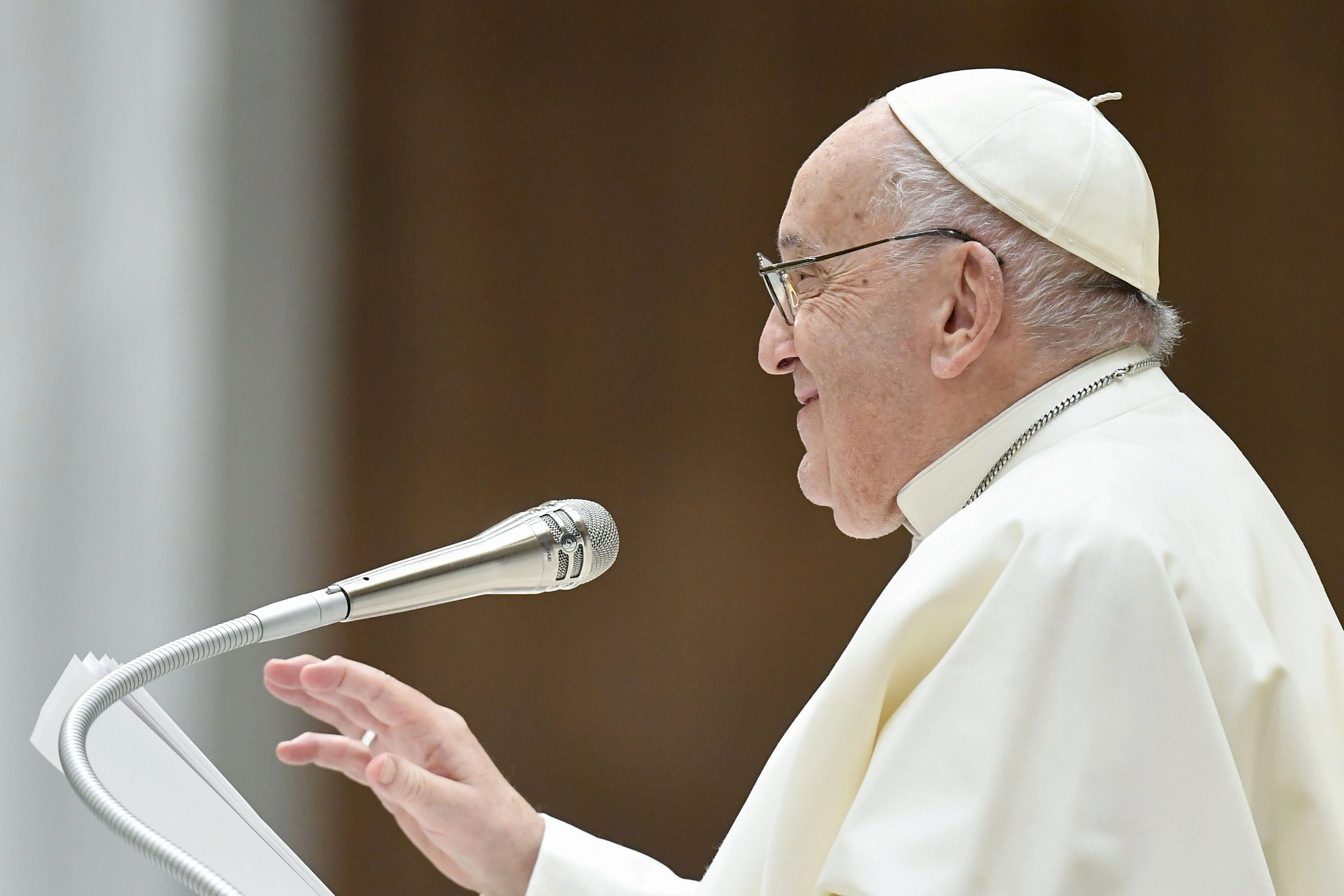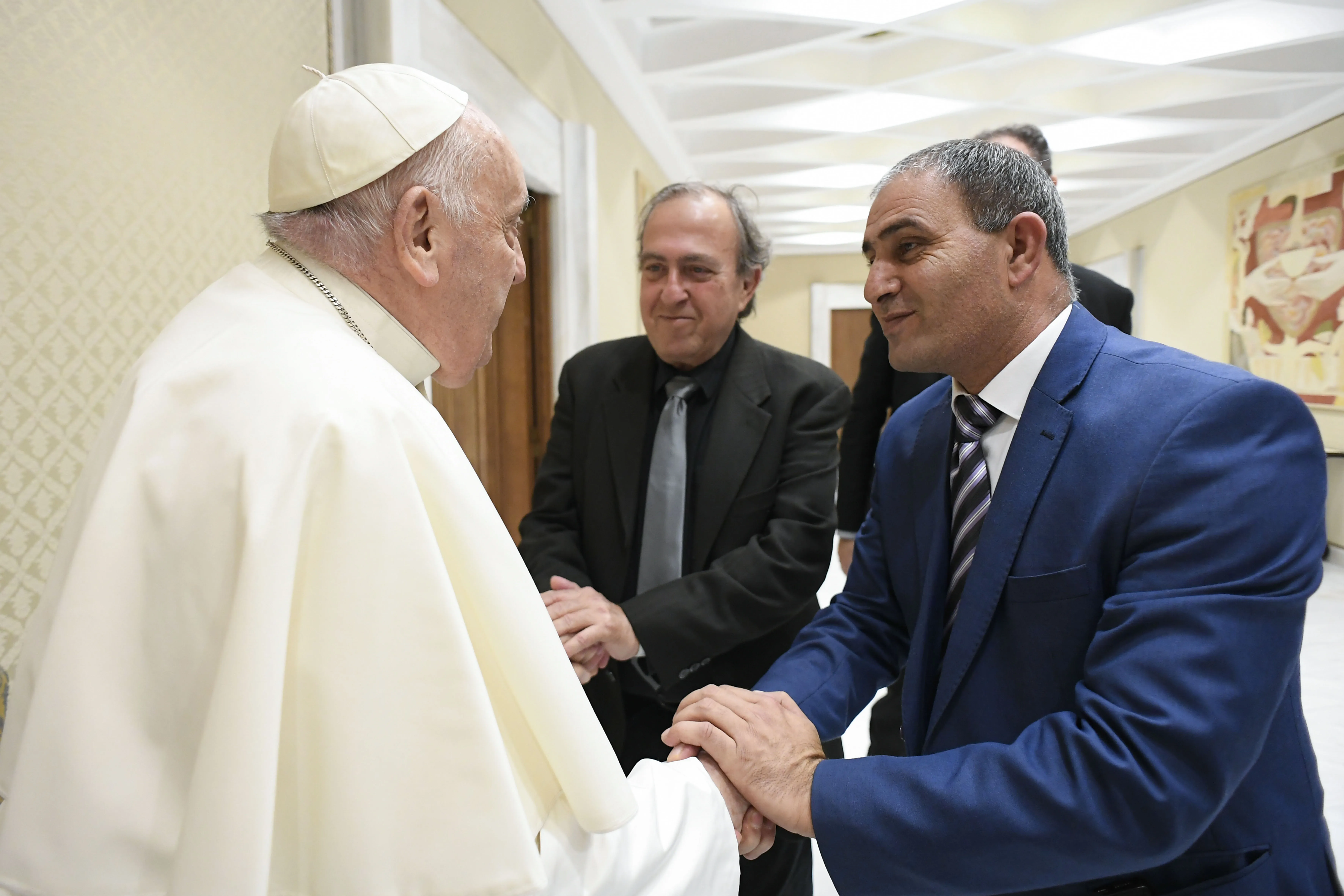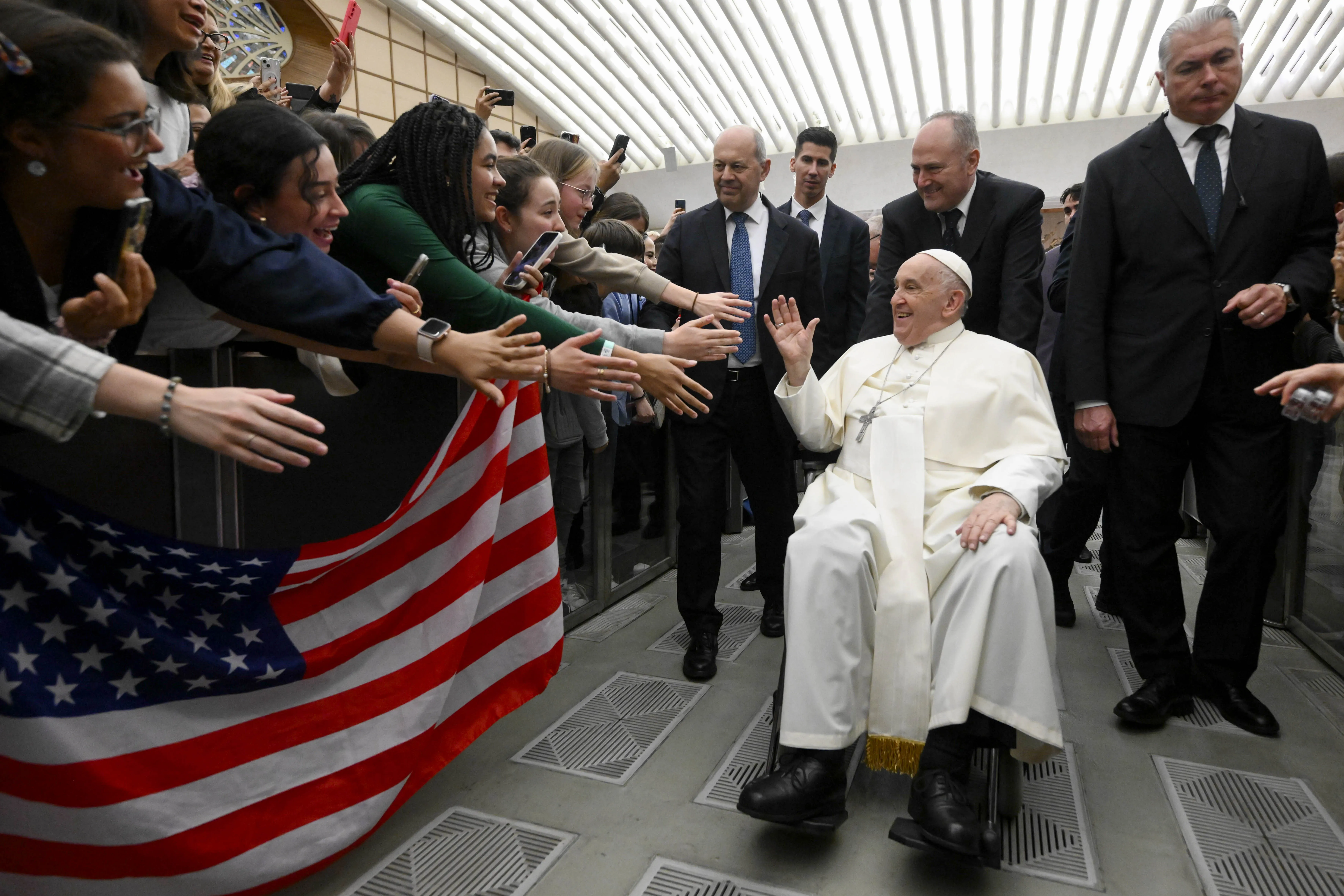
Vatican City, Mar 27, 2024 / 09:30 am (CNA).
Pope Francis on Wednesday used the example of two men — one Palestinian, one Israeli, both of whom lost their daughters in violent conflicts — to reflect on Christ’s suffering and his patience as the Church prepares for Good Friday and Easter Sunday.
Calling attention to the two men present at his general audience in the Paul VI Hall, the Holy Father told the assembly: “Both lost their daughters in this war and both are friends. They don’t look at the enmity of war, but they look at the friendship of two men who love each other and who went through the same crucifixion.”
“Let us think of this very beautiful testimony of these two people who suffered with their daughters from the war in the Holy Land. Dear brothers, thank you for your testimony.”

Before the opening of the general audience, Pope Francis met briefly with the two fathers, exchanging embraces and several gifts.
Rami Elhanan lost his 14-year-old daughter, Smadar, in 1997 when she was killed by a Palestinian suicide bomber while out shopping with friends in the center of Jerusalem.
Bassam Aramin lost his 10-year-old daughter Abir in 2007. She was shot dead outside her school by a young Israeli soldier.
Both men have dedicated themselves to working toward peace in the war-torn region through the Parents Circle Families Forum, an association of Israeli and Palestinian families who recount their process of bereavement and spearhead projects aimed at greater dialogue and peace initiatives.

“Brothers and sisters, let us pray for peace,” the pope said. “May there be peace in the Holy Land. May the Lord give peace to all, as a gift of his Easter”
The general audience, which was scheduled to take place in St. Peter’s Square, was moved to the Paul VI Audience Hall as central Italy headed into its second day of heavy rain.
“Today the audience was scheduled in the square, but due to the rain it was moved inside. It’s true that you will be a little crowded, but at least we won’t be wet! Thank you for your patience,” the pope said.
Reflecting on the passion reading from Palm Sunday, the pope opened his remarks by noting that the suffering of Christ showcases his patience and love.
“It is precisely in the Passion that Christ’s patience emerges, as with meekness and mildness he accepts being arrested, beaten, and condemned unjustly,” the pope said. “He does not recriminate before Pilate. He bears being insulted, spat upon, and flagellated by the soldiers. He carries the weight of the cross. He forgives those who nail him to the wood; and on the cross, he does not respond to provocations but rather offers mercy.”

“Patience,” the pope continued, “is not only a need but a calling: If Christ is patient, the Christian is called to be patient.”
Responding to the question of how to grow in patience, Pope Francis implored the faithful to “broaden one’s outlook” and “to contemplate the Crucified One” as a way to cultivate greater patience with others, especially against the backdrop of Holy Week.
“It starts by asking to look at them with compassion, with God’s gaze, knowing how to distinguish their faces from their faults.”
The pope ended by challenging the faithful to “go against the tide” of instant gratification and to instead cultivate this virtue in order to challenge “haste” and “impatience,” which “are the enemies of spiritual life.”
“God is love, and those who love do not tire, they are not irascible, they do not give ultimatums but know how to wait.”
If you value the news and views Catholic World Report provides, please consider donating to support our efforts. Your contribution will help us continue to make CWR available to all readers worldwide for free, without a subscription. Thank you for your generosity!
Click here for more information on donating to CWR. Click here to sign up for our newsletter.





Worldbuilding is a beautiful project. Friends Rami Elhanan and Bassam Aramin are showing the way.
Yes, on all sides the innocent and concrete victims of evil…And, yet, this and more.
Two quotes and a question:
FIRST, about “the Crucified One,” Benedict wrote a meditation entitled “Behold the Pierced One” (Ratzinger, Ignatius, 1986):
“We must acknowledge, however, that faith is seriously weakened and threatened within the Church. Even we in the Church have lost courage. We feel it to be arrogance or triumphalism to assume that the Christian faith tells the truth. We have picked up the idea that all religions are the product of history, some developing this way and others that, and that every person is as he is because of the accident of birth. Such a view reduces religion from the level of truth to the level of habit [….] There is a great temptation to say, ‘But there is so much suffering in the world!—let’s suspend the question of truth for a while. First let’s get on with the great social tasks of liberation; then, one day, we will indulge in the luxury question of truth.’”
SECOND, and, about the “accident of birth” and a “pluralism” of religions, this from Islam:
“There is not a child that he or she is born upon this fitrah, this original state of the knowledge of God. And his parents make him a Jew, a Christian, or a Zoroastrian . . . and if they are Muslims, Muslim” (From the hadith as reported by Bukhari, Sahih, I:34; and cited in Hassan, “The Concept of State and Law in Islam,” 1981, p. 97; and cited again Ayoub in Omar (ed.), “A Muslim View of Christianity,” 2007, p. 13).
The imposing self-mage Islam is that there is only one universal religion, itself.
QUESTION: In the formerly Christian West and beyond, a distinction is/was made between the universal (!) natural law in its unadulterated integrity, and the confirming self-disclosure of the Triune One in the Incarnation and Resurrection: “the Word made flesh,” not Islam’s “word made book.”
With Fiducia Supplicans now on the books with its blessing of “irregular couples” as such, what now of the natural law? Or, of the faith? “World building”?